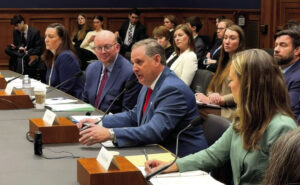Hispanics protest new immigration law
The Hispanic community across the state took strides on Wednesday to make a statement against the new immigration law in Alabama and let others know Alabama needs the Hispanic population.
Franklin County’s Hispanic community made a strong statement by closing businesses, not reporting to work and keeping children home from school.
The day of protest was labeled “A Day Without Latinos” by one downtown Russellville business that had closed its doors for the day.
Maclovia Pedroza, a legal resident who has lived in the U.S. for 17 years, said she participated in Wednesday’s silent protest in the hopes that Alabamians would take a look at how the Hispanic population has a positive effect on the state.
Pedroza said she and her family stayed at home and refrained from buying anything at local stores.
“I love America and we want our American brothers to realize that we are not stalling or hurting nothing in their lives,” Pedroza said. “We are strengthening the economy of Alabama. You can see the farmers will lose millions because other people didn’t want to do those jobs.
“The most important thing is to be united to get stronger. Even though I am legal, I want to do something for my people.”
Margaret McDonald, a public relations representative for Pilgrim’s Pride, said the company, which has a very high number of Hispanic employees, knew about the day of protest in advance.
“Several of our employees at the Boaz plant came very respectfully to management and explained that they would be absent from work in order to make a statement against the immigration law,” McDonald said. “The Boaz plant was closed on Wednesday except for a few lines that were working on a volunteer basis.”
McDonald said even though the Boaz plant was closed, the Russellville plant remained open.
“I received word from HR that work went as scheduled at the Russellville plant on Wednesday,” she said.
Exact numbers as to how many people actually missed worked at the Russellville plant were not available.
In addition to businesses, schools also saw a drastic increase in the number of Hispanic students who were absent from classes on Wednesday.
According to Russellville Superintendent Rex Mayfield, Russellville City Schools had 170 Hispanic children absent system-wide on Wednesday out of a total of 800.
“I’ve been keeping an eye on the numbers for the past couple of weeks and the most we’ve had absent on one day up until today was around 60,” Mayfield said.
Franklin County Superintendent Gary Williams said the only two schools in their system with a significant Hispanic population are Tharptown High School and Tharptown Elementary School, both of which saw significant absences Wednesday.
“We had 38 absent at the elementary school and 30 absent at the high school, which is a lot more than we’ve had,” Williams said.
Many say the protest is in response to the fear many in the Hispanic community are feeling about the new law and the uncertainty their future holds.
To calm some of those fears, Sen. Roger Bedford held a public meeting at the A. W. Todd Centre in downtown Russellville Thursday night to explain the new immigration law with the help of Birmingham attorney Kitty Rogers Brown and Cullman attorney Champ Crocker.
Well over 500 people, mainly from the Hispanic community, attended the meeting to get answers and find out what they should be doing.
“I was very impressed with the turnout for the public meeting,” Bedford said. “It was a good opportunity for us to hear directly from the Hispanic community about their fears like their families being torn apart and not being able to pay their property taxes or renew their tags.
“We had a question and answer session where we attempted to answer some of the questions from the audience about the legal case surrounding the law. We didn’t answer every question or provide all the answers, but I think the meeting was very productive.”
Pedroza attended the meeting and said she was glad someone was taking the time to explain the new laws to their community.
“This meeting will give knowledge of what we should do in this hard situation,” Pedroza said. “Most of us are Christians who love God and we do believe this meeting will help families who are struggling with this. We are all brothers. It does not matter the color of our skin.”
Bedford said he hoped the meeting served to assure the Hispanic community that no on wanted to “run them out of town.”
“We want our Hispanic neighbors to be legal, obey the law and pay taxes but the current system we have isn’t working,” Bedford said. “I spoke to one lady who has spent 18 years and $22,000 in legal fees trying to become a U.S. citizen and still hasn’t received her status.
“Ultimately, we need to have a federal policy in place where you can legally and lawfully become a citizen. Until then, we’re going to have a different policy coming from each of the 50 states and that’s just not going to work.”
So far, the appeals court has struck out several parts of the immigration law deemed unconstitutional, most recently of which was the provision that required schools to check the immigration status of students and the provision that makes it a crime for immigrants to not have proper documentation, according to an opinion released on Friday by the 11th U.S. Circuit Court of Appeals.







